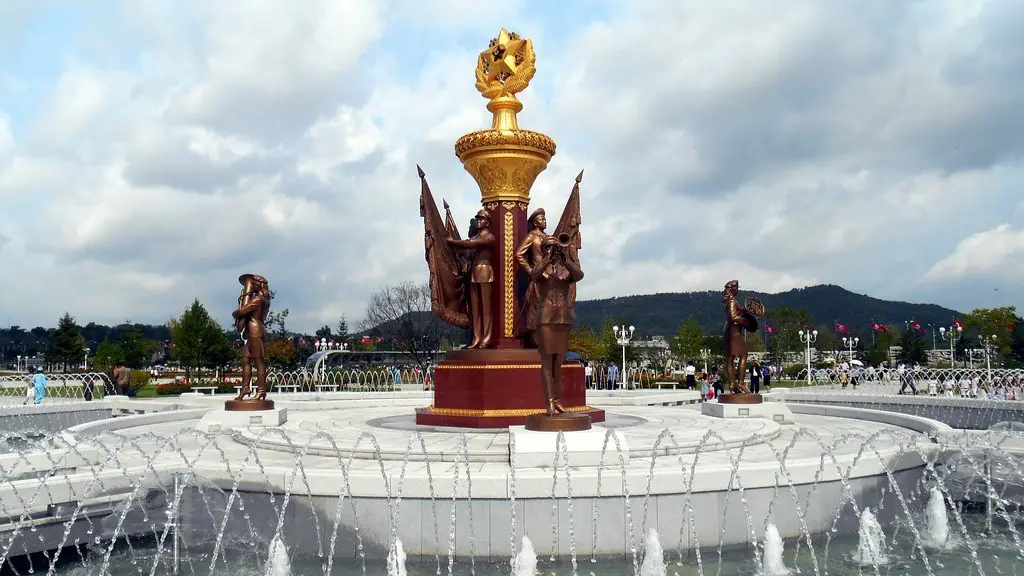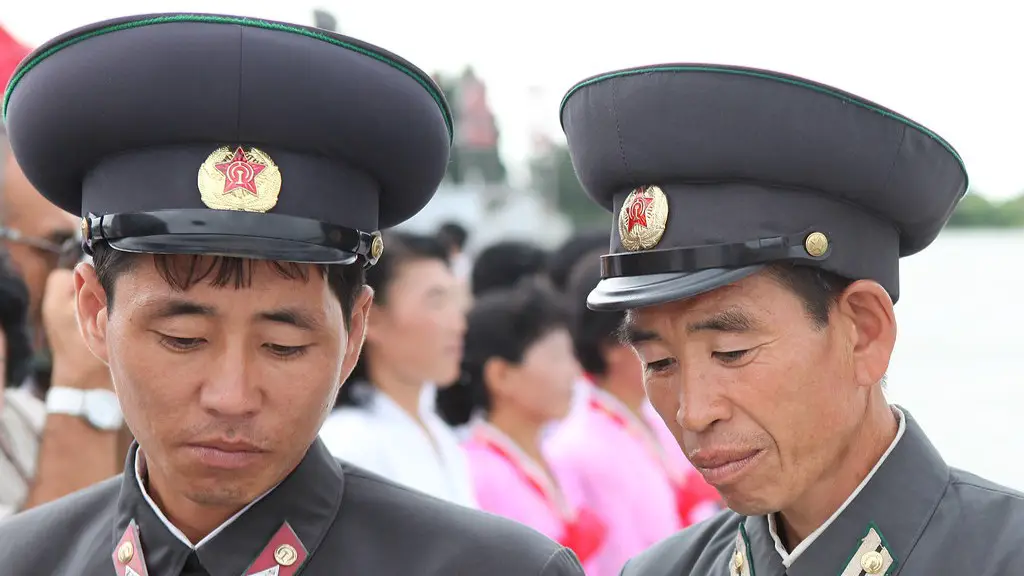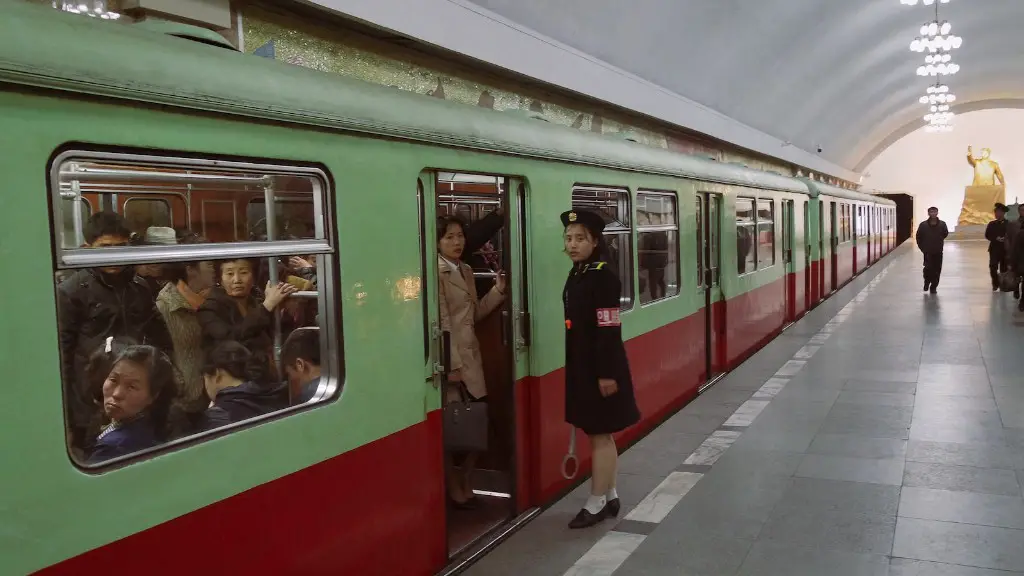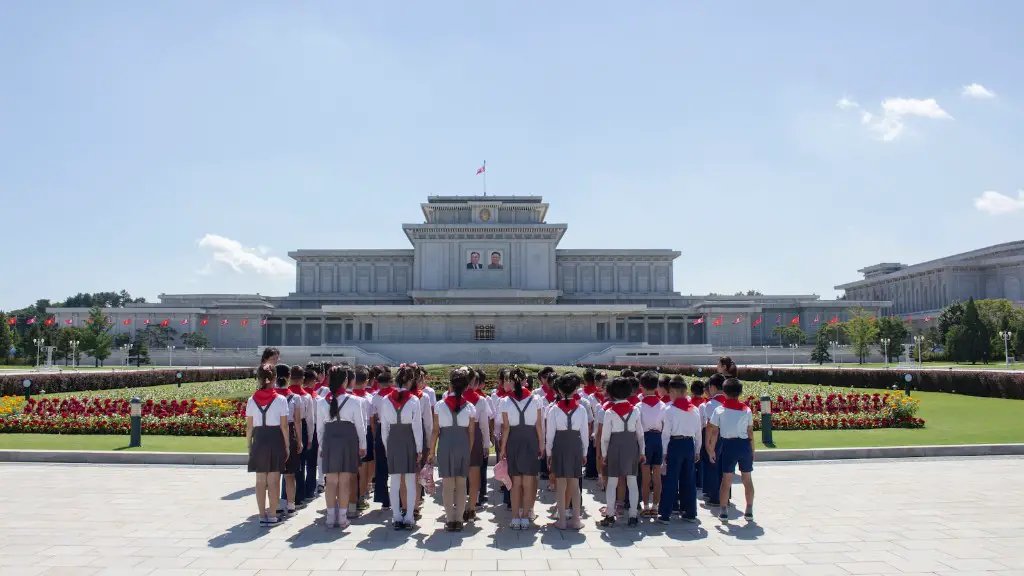North Korea, officially the Democratic People’s Republic of Korea, has always been noted for its private, mysterious, and isolated tendencies. Throughout the years, North Korea has been compared to a dark void in terms of international relations and its lack of transparency has made it the object of much curiosity and scrutiny. Is North Korea really so private and mysterious? Why is North Korea so private?
The answer to this question may lie in the country’s history and the leadership’s insecurity. North Korea is an isolated country, largely because of its past and years of conflict with South Korea, other neighboring countries and even the United States. Over the years, the North Korean leadership has been wary of outside influence and has taken steps to prevent the spread of information about their country. The leadership has imposed strict censorship laws and media regulations, making it difficult for foreign media outlets to access the country. This has left many analysts wondering what is really happening inside of North Korea.
Furthermore, North Korea has one of the most concentrated and repressive regimes in the world, known as “juche”. This means that the government holds tight control over the beliefs, values and norms of its people and prohibits any sort of freedom of expression. Despite the fact that the country is slowly opening up and its citizens have access to some sort of internet, North Korea has stuck to its traditional and secretive ways when it comes to societal matters.
The North Korean leadership’s need for complete control and its desire to avoid outside influence are two clear reasons why North Korea is so private. However, some analysts argue that the government’s motivations go beyond control – they believe North Korea is purposely trying to keep its people in the dark. The North Korean government has been known to propagate a certain image of themselves that is often at odds with reality. They selectively allow certain information, activities, and people to be seen by the public, while withholding others.
North Korea has also been accused of deepening its isolation and hoarding of information in order to publicly demonstrate strength, stability and prosperity. Despite international sanctions and criticism, North Korea continues to maintain its isolationist and secretive policy – an indication of their deep-rooted distrust in the international community.
In a way, North Korea’s private and mysterious stance can also be seen as a strategy to survive in a complex global environment. Indeed, the government’s control on information and its ability to project a self-serving image domestically and internationally have allowed North Korea to stand its own among the community of nations.
Reasons Behind North Korea’s Secrecy
Although it is difficult to understand the reasons behind North Korea’s secrecy, there are indeed multiple explanations that could explain the situation. For example, North Korea has pursued a policy of self-reliance and juche – self-reliance in the economy, politics and essentially in all fields. It appears that this strategy, although outdated and unrealistic, has been an effective tool in preserving and managing the internal environment.
In addition, North Korea’s tight control over information has served as a means to prevent military actions against the regime and to shield the country from international criticism. For instance, North Korea refuses to talk to almost any foreign media outlets and has created a hostile response to any foreign criticism of the country.
Finally, the North Korean leadership has used its isolated stance to boost its international standing. North Korea has been able to portray itself as a strong, unbreakable nation, while at the same time using its private and mysterious demeanor to manipulate certain groups and spread its own version of the nation’s story.
US-North Korea Relations
The United States has had a complicated and often hostile relationship with North Korea for many years. The US has been critical of North Korea’s “hermit kingdom” policies, arguing that its lack of openness and transparency has caused the nation to succumb to a number of poor economic and humanitarian crises. US-North Korean relations have been particularly tense between 2017 and 2018 – the infamous “war of words” between US President Donald Trump and North Korean leader Kim Jong Un reached an explosive height.
The two leaders engaged in numerous verbal battles, with Trump calling Kim Jong Un “short and fat” and Kim Jong Un labeling President Trump a “dotard”. The relationship between the two leaders was shaky and both countries were prompted to threaten military action. This period of conflict between the two countries is a reflection of how North Korea’s secretive nature had undoubtedly caused tension between the two countries.
However, a few months later in 2018, North Korea and the US shifted towards a more reconciliatory stance. North Korean leader Kim Jong Un agreed to meet with US President Donald Trump for a historic summit in Singapore. This summit that was held in Singapore in 2018 marked a breakthrough – it was the first time a US president had ever met with a North Korean leader since the nation’s inception in 1945. This summit gave hope of better US-North Korea relations in the future, something that would not have been possible had North Korea still been shrouded in secretive isolation.
North Korea the ‘Forbidden Country’
North Korea has commonly been referred to as the ‘Forbidden Country’ due to its tight restrictions on its citizens and foreigners. The country’s secretive and reclusive behaviour has caused a deep sense of mystery to develop around the nation, making it a fascinating and somewhat intimidating country to visit or simply learn about.
Tourists seem to be particularly curious about the many secrets that North Korea holds. Although tourism itself is strictly limited in North Korea and private travel is often prohibited, a few select groups of foreign travelers are still allowed to go. These people can catch a glimpse of the mysterious country and are picked up by (often minders) the minute they arrive in North Korea. These restricted visits, along with the carefully controlled media access, leave more questions than answers.
Furthermore, North Korea’s privacy has also been used as a way to certain groups to obtain funding, as the state’s mysterious behaviour often grants them potential schemes and assistance. North Korea is internationally seen as a “black box” – with its secretive policies and ambiguous approach, North Korea has been able to manipulate its environment both domestically and internationally to its own gain.
North Korea’s Struggling Economy
The economic and humanitarian crises in North Korea are well-documented – international sanctions, a lack of foreign investment and a dearth of natural resources have all left the country in dire economic straits. Conditions have become so dire, in fact, that an estimated 10 million people in North Korea are food-insecure. Additionally, due to the country’s lack of transparency, it is incredibly difficult for aid organisations and foreign governments to assess the situation, let alone do anything to improve it.
Unfortunately, the country’s secrecy has not only hampered its international diplomatic opportunities, but it has also caused the nation to suffer economically. The government’s control of information, its complete bans on certain activities, and its restrictive travel policies have made it impossible for any foreign investment to come into the country, leaving the North Korean economy refusing to take off.
At the same time, the secretive nature of North Korea has also led to a decrease in the country’s population. There have been reports of an alarming number of North Korean citizens fleeing in search of better living conditions elsewhere, which has greatly contributed to the country’s population crisis.
North Korea’s Future
Many analysts and experts agree that North Korea’s future is highly uncertain and there needs to be some form of change if North Korea is to succeed in the future. Many argue that North Korea should take steps to become less isolated, more transparent, and more open to foreign influence. For example, North Korea needs to allow foreign media to operate freely, allow more private travel, relax censorship laws and media regulations, and reform its juche policy to make the government more accountable to its citizens.
In any case, there are sure to be steps that need to be taken to improve US-North Korea relations, such as improving communication and mutual understanding. Without any drastic changes, it is difficult to imagine North Korea succeeding in the long run.
International Criticism
For years, North Korea has been heavily criticised by the international community for its secretive and reclusive behaviour. International organisations and foreign governments have often used harsh rhetoric to condemn North Korea’s policies, calling for better transparency and more openness. Despite this, North Korea has remained defiant and determined to stay true to its principles.
Much of this international criticism can be attributed to North Korea’s opportunistic manipulation of its own environment. For example, the country has been accused of using its secretive nature to sow discord and unrest amongst nations and to spread its own version of events. This has undoubtedly put North Korea at odds with the international community and has done nothing to help the government’s image.
Ultimately, there are no easy answers as to why North Korea is so private. Analysts and experts disagree on the nuances and motivations that may be behind the country’s secrecy. However, it is clear that North Korea’s rigid control of information, abuse of power, and reluctance to conform to international standards have resulted in a unique and isolated state that is both intriguing yet concerning.





